The Tell
Whether to tell the truth or not

Whether to tell the truth or notTelling the truth is considered to be an essential quality. Consequently, it is imperative to tell the truth when coping with various social contacts.First and foremost, telling the truth is beneficial to the established friendship and it will bring more new bosom friends. It will make friends feel that you very much value the precious friendship between them. In any case, misunderstandings will automatically be eradicated if some unhappy incidents occurred. The friendship thus will be more consolidated.Secondly, telling the truth can help to manage marriages as well. The increasing divorce rate now attests to the fact that many couples now are skeptical of each other. The distrust is a major contributor to the problem. Many of them frequently chose not to tell the truth when misunderstandings arose, striving to hide the truth to each other instead, which probably would give rise to divorces. If many of them could primarily confide the truth to the other party, imploring forgiveness cordially or explaining the misunderstanding frankly, many of the couples could still be on good terms.Furthermore, telling the truth can also be of paramount significance to parents and their children. Young people are growing more reluctant to communicate with their parents, endeavoring to conceal anything from their parents. Henceforth, some unexpected disputes may be incurred. If young people can tell the truth, showing enough confidence in and exchanging ideas with their parents, everything will go on smoothly as anticipated.Notwithstanding, due to the facts mentioned above, it does not absolutely meantelling the truth all the time without any exception. On some occasions, if the truth is going to harm the people around us, prudent precautions must be taken before deciding whether to tell the truth or not.In conclusion, telling the truth is bound to render you an approachable and popular person among your friends, parents and your future half. Therefore, let us make our sensible decisions and tell the truth.。
thetelltaleheart主要内容
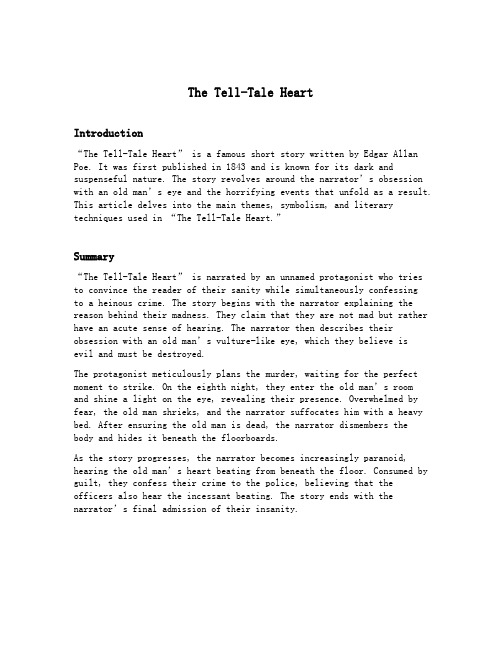
The Tell-Tale HeartIntroduction“The Tell-Tale Heart” is a famous short story written by Edgar Allan Poe. It was first published in 1843 and is known for its dark and suspenseful nature. The story revolves around the narrator’s obsession with an old man’s eye and the horrifying events that unfold as a result. This article delves into the main themes, symbolism, and literary techniques used in “The Tell-Tale Heart.”Summary“The Tell-Tale Heart” is narrated by an unnamed protagonist who tries to convince the reader of their sanity while simultaneously confessing to a heinous crime. The story begins with the narrator explaining the reason behind their madness. They claim that they are not mad but rather have an acute sense of hearing. The narrator then describes their obsession with an old man’s vulture-like eye, which they believe isevil and must be destroyed.The protagonist meticulously plans the murder, waiting for the perfect moment to strike. On the eighth night, they enter the old man’s room and shine a light on the eye, revealing their presence. Overwhelmed by fear, the old man shrieks, and the narrator suffocates him with a heavy bed. After ensuring the old man is dead, the narrator dismembers the body and hides it beneath the floorboards.As the story progresses, the narrator becomes increasingly paranoid, hearing the old man’s heart beating from beneath the floor. Consumed by guilt, they confess their crime to the police, believing that the officers also hear the incessant beating. The story ends with the narrator’s final admission of their insanity.Themes1. Guilt and Conscience“The Tell-Tale Heart” explores the theme of guilt and conscience. The narrator’s guilt manifests in their increasing paranoia and obsession with the old man’s beating heart. This guilt drives them to confesstheir crime, unable to bear the burden any longer. Poe highlights the torment caused by a guilty conscience, suggesting that the truth will always find a way to reveal itself.2. MadnessMadness is a prevalent theme in Poe’s works, and “The Tell-Tale Heart” is no exception. T he narrator’s distorted perception of reality andtheir obsession with the old man’s eye are clear indications of their descent into madness. The story raises questions about the fine line between sanity and insanity and the extent to which one’s mind can be trusted.3. Fear and ParanoiaFear and paranoia play a significant role in “The Tell-Tale Heart.”The narrator’s fear of the old man’s eye drives them to commit the heinous act. However, this fear transforms into paranoia as they are haunted by the soun d of the old man’s beating heart. Poe skillfully portrays the effects of fear and paranoia on the human psyche, leadingto a chilling climax.Symbolism1. The EyeThe eye symbolizes the narrator’s obsession and the evil they perceivein the old man. It ser ves as a metaphor for the narrator’s own guilt,as they believe the eye can see through their facade of sanity. The eye also represents the concept of inner truth, as the narrator’s obsession ultimately leads to their confession.2. The HeartThe beating h eart symbolizes the narrator’s guilt and the persistenceof truth. It serves as a constant reminder of their crime, tormenting them until they can no longer bear the weight of their guilt. Theheart’s sound becomes a symbol of the narrator’s deteriorating mental state, driving them to confess their crime.Literary Techniques1. First-Person Narration“The Tell-Tale Heart” is narrated in the first person, allowingreaders to delve into the mind of the unreliable narrator. This perspective creates a sense of intimacy and immediacy, intensifying the story’s suspense and the reader’s engagement.2. RepetitionPoe uses repetition throughout the story to emphasize the narrator’s obsession and increasing madness. Phrases such as “I loved the old man” and “I heard all things in the heaven and in the earth” are repeated, creating a sense of unease and building tension.3. ForeshadowingPoe employs foreshadowing to build suspense and hint at the narrator’s eventual confession. The narrator’s constant references to thei r sanity and their insistence that they are not mad foreshadow their eventual descent into madness and guilt.4. Symbolic ImageryPoe’s use of vivid and symbolic imagery enhances the story’s impact. The description of the old man’s eye as vulture-like and evil creates a sense of dread and repulsion. The imagery of the beating heart beneaththe floorboards evokes a visceral response, heightening the story’s tension.Conclusion“The Tell-Tale Heart” is a masterful work of Gothic fiction that explores themes of guilt, madness, fear, and paranoia. Through its use of symbolism and literary techniques, the story delves into the dark recesses of the human mind, leaving readers with a sense of unease and a deeper understanding of the complexities of the human psyche. Edgar Allan Poe’s “The Tell-Tale Heart” continues to captivate readers with its timeless themes and chilling narrative.。
the tell-tale heart 译文
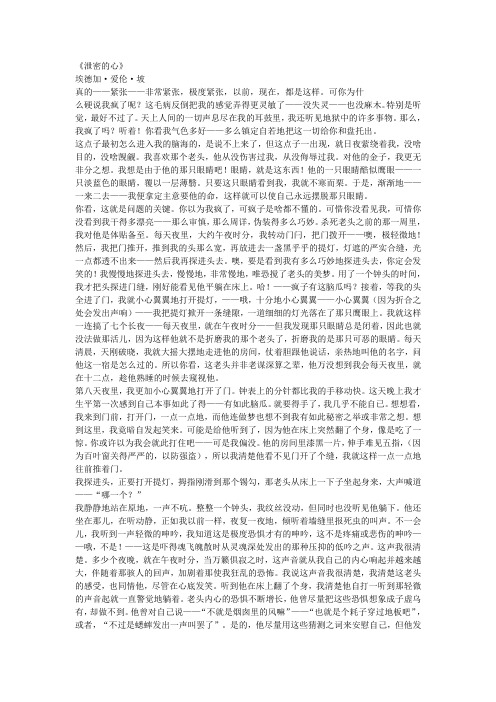
《泄密的心》埃德加·爱伦·坡真的——紧张——非常紧张,极度紧张,以前,现在,都是这样。
可你为什么硬说我疯了呢?这毛病反倒把我的感觉弄得更灵敏了——没失灵——也没麻木。
特别是听觉,最好不过了。
天上人间的一切声息尽在我的耳鼓里,我还听见地狱中的许多事物。
那么,我疯了吗?听着!你看我气色多好——多么镇定自若地把这一切给你和盘托出。
这点子最初怎么进入我的脑海的,是说不上来了,但这点子一出现,就日夜萦绕着我,没啥目的,没啥觊觎。
我喜欢那个老头,他从没伤害过我,从没侮辱过我。
对他的金子,我更无非分之想。
我想是由于他的那只眼睛吧!眼睛,就是这东西!他的一只眼睛酷似鹰眼——一只淡蓝色的眼睛,覆以一层薄翳。
只要这只眼睛看到我,我就不寒而栗。
于是,渐渐地——一来二去——我便拿定主意要他的命,这样就可以使自己永远摆脱那只眼睛。
你看,这就是问题的关键。
你以为我疯了,可疯子是啥都不懂的。
可惜你没看见我,可惜你没看到我干得多漂亮——那么审慎,那么周详,伪装得多么巧妙。
杀死老头之前的那一周里,我对他是体贴备至。
每天夜里,大约午夜时分,我转动门闩,把门拨开——噢,极轻微地!然后,我把门推开,推到我的头那么宽,再放进去一盏黑乎乎的提灯,灯遮的严实合缝,光一点都透不出来——然后我再探进头去。
噢,要是看到我有多么巧妙地探进头去,你定会发笑的!我慢慢地探进头去,慢慢地,非常慢地,唯恐搅了老头的美梦。
用了一个钟头的时间,我才把头探进门缝,刚好能看见他平躺在床上。
哈!——疯子有这脑瓜吗?接着,等我的头全进了门,我就小心翼翼地打开提灯,——哦,十分地小心翼翼——小心翼翼(因为折合之处会发出声响)——我把提灯掀开一条缝隙,一道细细的灯光落在了那只鹰眼上。
我就这样一连搞了七个长夜——每天夜里,就在午夜时分——但我发现那只眼睛总是闭着,因此也就没法做那活儿,因为这样他就不是折磨我的那个老头了,折磨我的是那只可恶的眼睛。
每天清晨,天刚破晓,我就大摇大摆地走进他的房间,仗着胆跟他说话,亲热地叫他的名字,问他这一宿是怎么过的。
人教Could you please tell me where the restrooms are
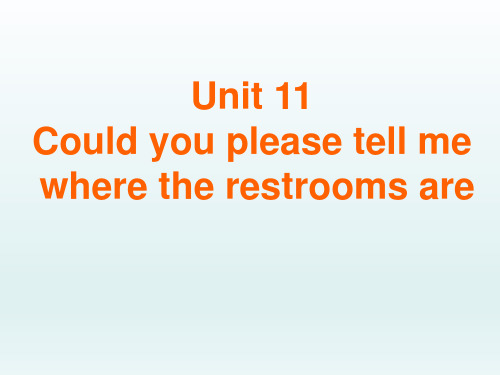
3b
Group work
FOR EXAMPLE:
I always go to the mall with my friend, Jack.
I think it has advantages, just like it has a loat where is very crowed there.
Tell ways
Go across the bridge. You can’t miss it. Go along…, and turn right at… Walk down… and turn left… Go straight to… and cross… You can take No. 10 bus, it’ll take you right there.
Ask ways
Excuse me. Where’s the (nearest)…, please ? Is there a (an) …near here? Which is the way to …, please ? Could you tell me how to get to…? Is this the right way to …? Can you tell me the way to …? I want to go to …. Do you know the way ? Would you please tell me where…? Will you tell me how to get to…? Could you tell me the way to…? Can you tell me which is the way to…?
Daily’s department store
library post office
九年级Unit3 Could you please tell me where the重点解析

人教版英语九年级单元重点知识Unit3Could you please tell me where the restrooms are?.基础夯实【重点单词短语过关】读一读背一背grape n.葡萄central adj中心的;中央的nearby adj附近的;邻近的adv在附近;附近mail v.邮寄;发电子郎件n.邮件east adj.东方的;东部的adv向东;n.东方fascinating adj迷人的;有吸引力的expensive adj.不昂贵的uncrowded adj不拥挤的;人少的convenient adj,便利的;方便的mall n.商场;购物中心pass by路过;经过restroom n.(美)洗手间;公共厕所stamp n.邮票;印章bookstore n.书店beside prep.在……旁边;在……附近postcard n.明信片pardon v.原谅 Interj请再说一遍washroom n.洗手间;厕所bathroom n.浴室;洗手间normally adv.通常;正常情况下rush v.&n.仓促;急促suggest v.建议;提议【重点单词短语过关】读一读背一背clerk n.职员corner n.拐角;角落politely adv.礼貌地;客气地request n.要求;请求direction n.方向;方位correct adj.正确的;恰当的polite adj.有礼貌的;客气的direct adj.直接的;直率的speaker n讲(某种语言)的人;发言者whom pron.谁;什么人polite adj不礼貌的;粗鲁的address n.住址;地址;通讯处underground adj地下的;n地铁course n.课程;学科Italian adj意大利\人的;n.意大利人\语staff n.管理人员;职工a pair of一对一双一副between A and B在A和B之间on one’s/the way to 在去...的路上pardon me 对不起 ; 原谅我 ; 请原谅【重点单词短语过关】读一读背一背pass by 路过,经过look forward to 期待,盼望 ; 预期,预料excuse me 对不起,打扰一下turn left \ right 向左 \向右转go past 路过,经过on time 准时,按时get to 到达have dinner 吃晚饭 ; 吃饭 ; 吃正餐come on快点请过来the shopping center 购物中心 ; 商业中心lead into 引入 ; 导致Parking lot n.停车场【单元目标语句回顾】读一读练一练--Excuse me, could you please tell me how toget to the bookstore?--Sure, just go alongMain Street until you pass Center Street.--The bookstore is onyour right, beside the bank.--Do you know when the bookstore closes today?--It closes at 7:00 p.m. today.--Excuse me, do you know where I can get some postcards?--Sure. Go to the second floor. There’s a bookstore between the bank and the supermarket.【单元目标语句回顾】读一读练一练--Could you please tell me how to get to the post office?--Sorry, I’m not sure how to get there.--Can you tell me when the band starts playing this evening?--It starts at 8:00 p.m.--I wonder where we should go next.--You should try that new ride over there.单词和短语精讲1. Excuse me用法Excuse me是英语中常用的的客套用语,根据不同情境可理解为“请问”、“请原谅”、“不好意思,打扰一下”等。
the tell-tale heart 译文

the tell-tale heart 译文我感到真的——紧张——非常紧张,极度紧张,过去和现在都是这样。
但你为什么坚持说我疯了呢?这个毛病反而让我的感官更加敏锐——没有失灵——也没有麻木。
特别是听觉,我听到了世间万物的声音,甚至听到了地狱中的一切。
那么,我真的疯了吗?请听我说!看看我的脸色多好——我很冷静地向你描述这一切。
这个想法最初是怎么进入我的脑海的,我已经记不清了,但一旦出现,就一直萦绕着我,没有目的,没有企图。
我喜欢那个老人,他从来没有伤害过我,也没有侮辱过我。
但是,我对他的一只眼睛非常恐惧——那只眼睛像鹰一样锐利,淡蓝色,覆盖着一层薄膜。
只要那只眼睛看着我,我就会感到寒意。
渐渐地——一来二去——我决定要杀了他,这样我就可以永远摆脱那只眼睛。
这就是问题的关键。
你认为我疯了,但___什么都不懂。
可惜你没有亲眼见证我做的事情,可惜你没有看到我的精彩表演——我非常小心、非常周到地伪装自己。
在杀死老人之前的一周,我对他关心备至。
每天午夜时分,我轻轻转动门闩,把门打开——非常轻微的声音!然后,我把门推开,推到我的头那么宽,再把黑暗中的提灯放进去,提灯的遮盖非常严密,没有一点光线透出来——然后我再探进去。
如果你看到我多么巧妙地探进门缝,你一定会笑的!我慢慢地探进去,非常慢地,唯恐打扰老人的美梦。
我花了一个小时才把头探进门缝,刚好能看到他平躺在床上。
哈!——疯子能有这样的头脑吗?然后,当我的头完全进入时,我小心翼翼地打开提灯,——非常小心翼翼——非常小心翼翼(因为提灯的折叠会发出声响)——我把提灯掀开一条缝隙,一道细细的灯光照在了那只鹰眼上。
我连续这样做了七个晚上——每天晚上都在午夜时分——但我发现那只眼睛总是闭着,所以我无法完成我的计划,因为那只可恶的眼睛一直在折磨我。
每天清晨,天刚破晓,我就大摇大摆地走进他的房间,和他说话,亲切地叫他的名字,询问他昨晚过得如何。
所以,你看,这个老人并不是一个老谋深算的人,他从来没有想到我会在每天晚上十二点趁他熟睡时窥视他。
The TellTale HeartPPT课件

Internal conflict
The evil I
My feeling of guilty
11
Climax
• The end of the story was also the climax. It depicts the disturbed state of mind of the neurotic murderer. As the narrator sited with the police, he began to hear a sound in his ears “a low, dull, quick soundmuch such as a watch makes when enveloped in cotton”. The narrator’s “telltale” heart caused him to convict himself.
• Thus the narrator revealed his madness in the very attempt to deny it.
5
Summery
• and destroyed all the traces. Policemen came, but they detected nothing of the murder. However, when he fancied he heard the old man’s heart beating louder and louder, he cannot stand the psychological pressure any longer. Thus he confessed to his horrible deed.
6
Plot
广州版小学英语五年级下册:Unit 11 Can you tell me the way

Unit 11 Can you tell me the way?Focus PointsLet’s TalkDo you know the way to the market from your house? How can you get there? Please talk about it with your partner.Warming Up一.听写二、单词及短语1.在......后面______________________2. 在......旁边_____________________3.靠近,紧邻_____________________4. 在...... 前面____________________5.在右边_________________________6. 在左边________________________7.在......附近______________________8. 方向__________________________9. 路_____________________________ 10. 迷路的_______________________ 11. 医院__________________________ 12. 笔直地_______________________ 13. 错过__________________________ 14. 银行_________________________ 15. 邮局__________________________ 16. 火车站_______________________ 17. 饭店__________________________ 18. 警察局______________________三.课文内容根据提示把句子补充完整。
Janet: Oh, dear! I think we’re________.Ben: Let’s go and ask the lady ________ there.Janet: Excuse me. ________ you tell me the ________ ________ the hospital, please?Lady: Of course. Let me see. Go ________ ahead then turn right ________ the second ________. Ben: Is the hospital on the left ________ on the right?Lady: It’s the building on your right, ________ to the school. You can’t ________ it.Janet and Ben: Thank you so much.Language Points【知识考点一】Can you tell me the way to the hospital, please? 请问你能告诉我去医院的路吗?the way to... 意为“到......的路”can意为“能,可以”,是情态动词,无人称和数的变化,后面接动词原形。
九年级英语全册 Unit 3 Could you please tell me where the

3. Where does Bill come from? Do you know? (改为含有(hán yǒu) 宾语从句的复合句) Do you know__________ __________ __________ __________ ? 4. “Do you often chat online? ”Jack asked me. (改为含有(hán yǒu) 宾语从句的复合句) Jack asked me__________ __________ often__________ __________ . 答案: 3. where Bill comes from 4. if I; chatted online
第八页,共26页。
【自主归纳】 (1)suggest后可接名词作宾语, 即suggest sth. 意为“建议……”。 (2)suggest后可接动名词作宾语, 即suggest doing sth. 意为“建议做某 事”。 (3)suggest 后 接 that 从 句 , 且 that 从 句 用 “ should+ 动 词 原 形 ” 结 构 (jiégòu), should可省略, 表示“建议……”。
第五页,共26页。
3. ——你能告诉我乐队今晚什么(shén me)时候开始演奏吗? —__________ __________ tell me when the band__________ __________ this evening? ——在晚上八点开始。 —It starts__________ 8: 00 p. m. 答案: Can you; starts playing; at
第十五页,共26页。
三、巧辨“两面孔” if和when既能引导状语从句, 又能引导宾语从句。 1. 引导宾语从句, 表示(biǎoshì)将来时, 常用一般将来时。 2. 引导状语从句, 表示(biǎoshì)将来时, 常用一般现在时表 示(biǎoshì)将来。
could you please tell me where the restrooms are知识
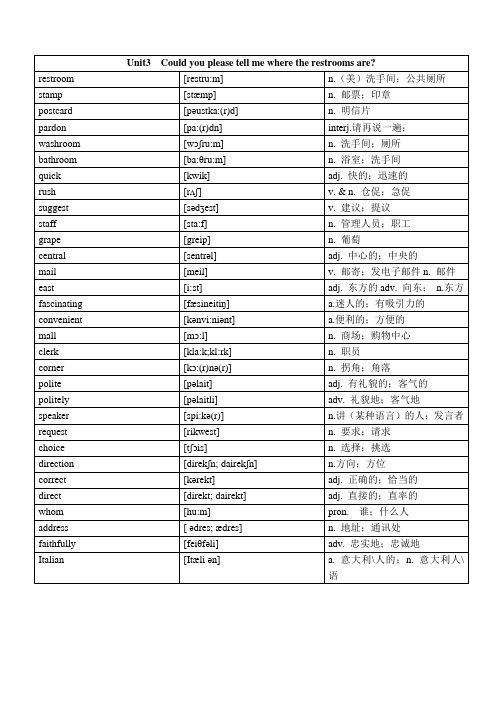
单元重点词组:1. 取一些钱________some money2. 一对;一双;一副a_________of3. 如何到达书店______ ______get to the bookstore4.在你的右边_______your right5. 向左/右转_________left/right.6. 在…和…之间________...and7. 经过go_________8. 对做某事感到兴奋be_________to do sth9. 来吧come__________10. 在某人去…的路上________one’s way________11. 走向前;朝…走去.walk_____ _______12. 请再说一遍;抱歉;对不起_______me13. 沿着这条街往东走go_______ _________this street14. 在三楼_______the________floor15. 礼貌地寻求帮助_______ ______help_________16. 盼望;期待(做)某事.look________to sth(doing) sth17. 听起来不礼貌sound______________18. 在某些情形下_________some_______________19. 第一次_______the________time20. 很抱歉打扰你be________to_______you21. 兑换一些钱________some money22. 由于某事感谢某人_______sb________(doing) sth中考连接1. She told me that she______ shopping with her sister the next day.A. will goB. would goC. goesD. has gone2. The teacher told us the moon____ around the earth.A. wentB. goesC. goingD. move3. The woman asked the policeman where ________.A. the post office isB. was the post officeC. is the post officeD. the post office was4. —Where are you going for the coming winter camp?—I won't decide on the place ________ the end of this month.A. untilB. unlessC. thoughD. through5. —Excuse me. Could you tell me ___ get to the nearest post office?—Sorry, I am new here.A.how can IB. how I couldC. how toD. what I can6. Traveling around big cities by taxi can cost a lot of money;but it's usually ________ to takethe underground train to most places.A. amazingB. expensiveC. convenientD. exciting7. —Let's go shopping at the new mall.—Why not shop online? It's ________.A. expensiveB. more expensiveC. less expensiveD. the most expensive8. Could you tell me ________ the cool Tshirt?A. where you buyB. where do you buyC. where did you buyD.where you bought9.— Do you know________?—Yes,I do. He went by skateboarding!A. whether Paul will go or notB. when will Paul go to the partyC. how Paul went to the partyD. how did Paul go to the party10.—All the workers went home yesterday ____ Mr. White. Why?—Because he was on duty.A. exceptB. besidesC. except forD. beside基础知识练习:I. 单项选择1. ___ old man in front of Tom is ___ artist.A. An;anB. A;theC. The;anD. The;a2. Everyone was _____when they heard the _______ news.A. exciting; excitingB.excited; excitingC. exciting;excitedD. Excited; excited3. —Shall we go for a picnic tomorrow? —Well,it all ___________ the weather.A. belongs toB. happens to C .depends on D. concentrate on4. Sorry,I haven’t ____ money _____ buy the new IPAD.A.such;thatB. too;toC. enough;toD. enough;for5.—Could you please tell me ________?—Yes. There is one on Center Street.A. where can I buy some stampsB. when you will take your vacationC. when was the telephone inventedD. if there are any good restaurants around here6.Could you please ____ such a thing again?A. not to doB. don’t doC. not doingD. not do7. They ____ five days finishing the work.A. paidB. tookC. spentD. cost8. His grade in the exam put him _________ the top students in his class.A. betweenB. overC. amongD. above9.Could you tell me________?A. what to do itB. what to doC. how to doD. when to do10. The man tried several times to start the car;and he succeeded______.A. in the pastB. in the endC. at firstD. at once11.Some of my friends eat with their eyes. They prefer to order what______ nice.A. feelsB. smellsC. looksD. tastes12. We live _______ a supermarket. It’s very convenient.A. rightB. far away fromC. next toD. on the right13. Would you please _______ the window? It’s hot now.A. closeB. to closeC. openD. to open14. —Do you know _______?—Yes;in two days.A. when will Mr Li come backB. how long Mr Li will come backC. what time will Mr Li come backD. how soon Mr Li will come back15. — Excuse me;could you please show me how to use this MP4 player?—_______A. Certainly! It’s here.B. Yes;you can.C. Sure;with pleasure.D. Not at all.16. Do you still remember _______?A. that he saidB. what he saidC. did he say thatD. what did he say17. The terrible accident happened ______ the evening of October 4th;2009.A. inB. onC. fromD. at18. In English;my sister does ______ speaking than writing.A. good atB. better atC. well inD. better in19. . Could you tell me ___________?A. where do you liveB. who you are waiting forC. who were you waiting forD. where you live in20. --- Do you know if she ___ back tomorrow?---Sorry;I don’t know. I’ll call you if she ___ back.A.will come;comesB. comes;comesC. comes;will comeD. will come;will come21. She told me the sun ______ in the east.A. riseB. roseC. risesD. had risen22. I can't understand ______the boy alone.A. why she leftB. why did she leaveC. why she had leftD. why had she left23.We are going for a picnic tomorrow. I'll call Wendy to make sure________.A. why to startB. when to startC. what to startD. which to start24. —Do you know sound travels very fast?—Yes. But light travels ________ sound.A. as fast asB. a little faster thanC. much faster thanD. slower than25.—Do you know ________ the man with glasses is?—A reporter,I think.A.whatB. thatC. whoD. where能力提升测试题一、单项选择( ) 1. Please tell me how many students __________ in your class next term.A. will there beB. will haveC. there will beD. have will( ) 2. She prefer __________ for a walk rather than __________ at home.A. to go;stayB. going;to stayC. go;stayingD. to go,staying( ) 3. Many visitors enjoy ________ a few hours _________ through the history museum.A. to spend; walkingB. spending; walkingC. spending; to walkD. to spend; to walk( ) 4. Make some marks __________ you find the mistakes in the article.A. whenB. whereC. beforeD. until二、句型转换1. Do you tell me where I can exchange money? (变为简单句)Do you tell me where _________ _________ money?2. Why don’t you go to the mall with your friends? (变为同义句)_________ _________ _________ to the mall with your friends?3. The fine arts museum is both beautiful and interesting. (变为同义句)The fine art museum is _________ _________ beautiful _________ _________ interesting.4. If you go into stores,you will always spend too much money. (变为简单句)Go into stores, _________ _________ will always spend too much money.5. I have no time to go to the market now. (变为同义句)I’m _________ busy _________ go to the market now.三、根据句意和首字母完成单词1. This washing machine is very c__________. You can do other things at the same time.2. During the summer v__________, I always like to go hiking with my friends in the hill.3. Sailing is a kind of f__________ sports enjoyed by young people.4. Where do you usually h__________ out with your friends in your free time?5. Taking s__________ to work is usually uncrowded and inexpensive.四、单句改错(每题有一处错误,找出并改正)6. I think the price of the book is too expensive. _______7. Would you like Other piece of bread? _______8. I prefer going to school by bike rather than walk there. _______9. The population of China is larger than any country in Asia. _______五、用所给词的适当形式填空10. Our Chinese teacher encourages us __________ our own stories. (create)11. My father will take computer __________ (lesson) this summer vacation.12. The badly __________ (injure) man was unable to stand up though struggling hard.13. The little girl has plain __________ (look), but a nice heart.14. The trip promised to be long but __________ (adventure).15. Nike always gets __________ (relax) from watching cartoons on TV.16. Make your own conversation __________ (use) the following words and phrases.17. You can take the escalator to the ________ (two) floor and turn right You can find it there.单元小测一、单项选择( ) 1. I don’t know ___________ Mr Wang lived ten years ago.A. whereB. whenC. whyD. which( ) 2. Li Lei is a good student. His teacher often speaks highly ___________ him.A. toB. ofC. withD. for( ) 3. Beijing is really a good place. I hope I can ___________ my lifetime there.A. liveB. takeC. spendD. leave( ) 4. —Jack,would you please pass me the salt?—_________.A. Not at all.B. No problem.C. My pleasure.D. No big deal. ( ) 5. Foreigners in Beijing learn the language ___________ Chinese culture.A. as long asB. as much asC. as far asD. as well as ( ) 6. I am not only reading English,but also ___________ the tape.A. learnB. hear ofC. hearingD. listening to ( ) 7. ___________ seemed strange to my brother that I liked maths.A. ThatB. ThisC. ID. It( ) 8. The weather here is very nice. It’s _________ too cold ___________ too hot.A. both;andB. either;orC. neither; norD. between;and ( ) 9. —Excuse me. Could you tell me ___________ get to the plane ?—Certainly. Go straight along here.A. how can weB. how we canC. when can weD. when we can ( ) 10. This is the best cartoon ___________ I have watched on TV this year.A. thatB. whichC. whoD. when。
the tell-tale heart
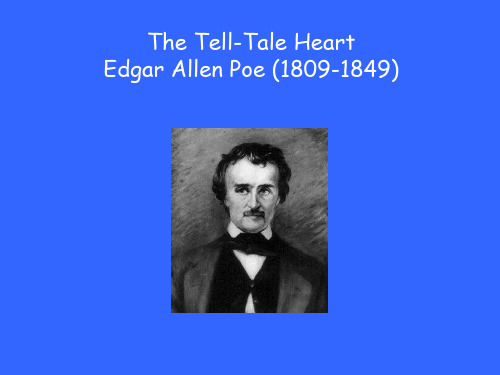
After two years in the army and a brief stay at West point, Poe became a successful editor in Richmond, Philadelphia, and New York and an industrious contributor to newspapers and magazines.
Poe’s Critical Theories:
“The death, then, of a beautiful woman is, unquestionably, the most poetical topic in the world — and equally is it beyond doubt that the lips best suited for such a topic are those of a bereaved (丧失亲友的) lover"
The Tell-Tale Heart Edgar Allen Poe (1809-1849)
Edgar Allen Poe, orphaned child of traveling actors, was raised by well-off foster parents (养 父母), John and Frances Allan, in Richmond, Virginia.
Poe’s Critical Theories:
As examples, we have “Annabel Lee,” “Lenore,” “Ligeia,” “To Helen” “The Raven” and numerous other works on this subject.
the_tell-tale_heart
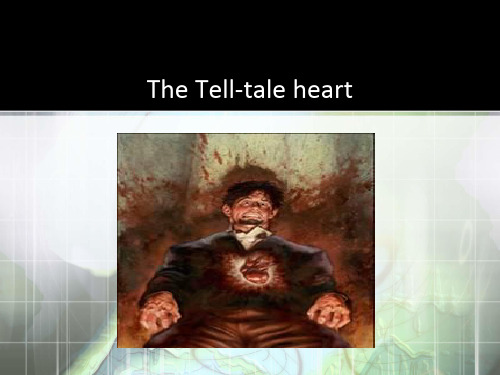
• He was the first well-known American writer to try to earn a living through writing alone, resulting in a financially difficult life and career. • 侦探小说鼻祖、科幻小说先驱之一、恐怖小说大师、短篇 哥特小说巅峰、象征主义先驱之一,唯美主义者。受到过 爱伦· 坡影响的主要人物有:柯南· 道尔、波德莱尔、斯特 芳· 马拉美、儒勒· 凡尔纳、罗伯特· 路易斯· 斯蒂文森、希区 柯克、蒂姆· 伯顿、江户川乱步等。
Transitional Page
It can be inferred that the murderer was quite anxious in his innermost. He strengthened these words again and again so that he could convince himself that he did not need to worry about anything unusual that would be found by the policemen. The more indifferent he pretended to be, the more anxious he was. The more frequently he insisted on his sanity, the more disturbed he impressed others. From this we can see that he was in some degree insane.
★ Poe’s writing style:
tell的过去式是什么意思

tell的过去式是什么意思tell的过去式是什么tell的过去式是:told。
读音:英[təʊld];美[toʊld];v. 告诉;吩咐;讲述;表达;辨别;判断;泄露(动词tell的过去式和过去分词)。
表示在过去同别人讲述的这一动作,一般与过去的时间相连接,如:yesterday、the other day 、the last day 等等,句子通常用一般过去时。
第三人称单数:tells 复数:tells 现在分词:telling 过去式:told 过去分词:told。
词语用法1、tell的基本意思是用语言或文字“告知”“告诉”“讲述”某事,强调思想的表达,而不强调表达的方式。
引申可表示“吩咐”“嘱托”“命令”“确定”“区分,辨别”“泄露秘密”“猜测”“产生效果”等。
2、tell可用作不及物动词,也可用作及物动词。
用作及物动词时,接名词、代词、带疑问词的动词不定式或wh-从句作宾语。
也可接双宾语,其直接宾语可以是名词或代词,也可以是带疑问词的动词不定式或that/wh-从句,其间接宾语可以转化为介词to的宾语。
例句1、It's very kind of you to tell me the truth.你真好,告诉我这真相。
2、Let me tell you some details about clearance.让我告诉你一些通关的细节。
3、Many colourful stories were told about him.关于他有很多有趣的故事。
4、Prison life, he told me, was terrible.他告诉我,监狱生活很恐怖。
5、He was told that the doors had been fitted incorrectly.他被告知那些门安装得不正确。
《Ifyoutellhimthetruthnowyouwillshowthatyouare

B 17.We can learn from the passage that A.genetics,grown-ups and birthplace
may cause shyness.
B.genetics,family size and birthplace
C.family size,grown-ups and failure
②at least“至少;起码”,其反义短语为at most,意为“至多”。 eg:It'll take you at least half an hour to get there.你们至少要用半小 时到达那儿。 ③honest形容词,意为“诚实的,正直的”。to be honest意为 “老实说;坦白地说”。 eg:He is an honest boy.他是一个诚实的男孩。 【注意】honest的第一个字母h不发音,它以元音音素 开头, 故前面的冠词应使用an,其名词形式是honesty。 apologise动词,意为“认错;道歉”。 【拓展】apologise to sb. 向某人道歉 apologise for (doing) sth. 因某事而道歉
But to my 12 ,when my mother arrived,“sorry” was the 13 word she said to me.Her 14 told me that she had been crying and her voice told me that she was really tired.“Will you forgive me?” at last she asked.I didn't know what to say.I just 15 her,and gave her a hug(拥抱).
- 1、下载文档前请自行甄别文档内容的完整性,平台不提供额外的编辑、内容补充、找答案等附加服务。
- 2、"仅部分预览"的文档,不可在线预览部分如存在完整性等问题,可反馈申请退款(可完整预览的文档不适用该条件!)。
- 3、如文档侵犯您的权益,请联系客服反馈,我们会尽快为您处理(人工客服工作时间:9:00-18:30)。
“I knew what the old man felt, and pitied him,although i chuckled at heart. I knew that he had been lying awake ever since the first slight noise …, but he found all in vain. All in vain, because Death, in approaching him...”
The narrator shares the story from his own, personal perspective; thus the story is told in a first-person point of view.
The narrator begins the story inquiring, "How then am I mad?" and states, "Observe how healthily--how calmly I can tell you the whole story" (Paragraph 1), to show us himself or herself is far away mad. Then, he or she tries to convince us of that fact by how carefully this brutal crime was planned and executed. ----- planed the murder for seven days; "more than usually cautious"; "opening the door little by little"
We can see that the murderer was just enjoying the fear and suffering of the poor old man. The consequence that the old man felt endangered and anxious was exactly what he wanted.
The story follows an unnamed narrator who insists on his sanity after murdering an old man with a "vulture eye". He waited for the chance, and committed the crime one night. After which he soberly deposited the dead body under the floor and destroyed all the traces, policemen came but they detected nothing of the murder. Shocked by the constant beating of the heart of the old man and a feeling that not only are the policemen aware of the sound, but that they also suspect him, the narrator confesses to killing the old man and tells them to tear up the floorboards to reveal the body.
The advantages of using this point of view
About the author
Edgar Allan Poe (1809 ~ 1849), The American poet, novelist and literary critic. Originator of detective novels, one of the pioneers of science fiction, horror fiction master, the peak of Gothic short novels, one of the pioneers of symbolism, esthete.Edgar Allan Poe's most famous literary and art theory is the "effect theory."
About the story
"The
Tell-Tale Heart" is widely considered a classic of the Gothic fiction genre and one of Poe's most famous short stories.
About the story
1、The use of first person point of view put readers into the position to the killer who is a mad person without consciousness. It seems that everything the hero does in the story is chosen by ourselves. We also have the ability to hear all things in the heaven and in the earth. We hate the color of the old man’s eye.
2 、The First point of view gives us an unforgettable experience to explore a world of a mad person. When we are reading, we are the person who want to finish the old man’s life. And we go through the whole process of murder.
The narrator tries to prove how sane he really is before the reader has read enough to make any kind of judgment about him.
"I loved tr wronged to me.
"And then, when I had made an opening sufficient for my head, I put in a dark lantern, all closed, closed, that no light shone out, and then I thrust in my head. Oh, you would have laughed to see how cunningly I thrust it in! I moved it slowly --very, very slowly, so that I might not disturb the old man's sleep."
His madness is definitely on a different level than just a psycho. This was the result of his insanity( 精神错 乱) ,schizophrenia(精神分裂症) and paranoia (妄想症). Thus, the reader comes to realize that the nameless narrator is truly insane and is therefore an unreliable narrator: his words cannot be trusted.
He had never given me insult. For his gold I had no desire. I think it was his eyes! yes, it was this. One of his eyes resembled that of a vulture blue eye, with a film over it. Whenever it fell upon me, my bloo d ran cold and so by degrees— very gradually— I made up my mind to take the life of the old man, an d thus rid myself of the eye forever"
The advantages of using first person point of view
By using personal pronouns such as I, me, and my, the narrator is able to tell his tale as only he can experience it. When the narrator is the protagonist and tells the story from a personal account it makes the overall impact of the story more vivid. It helps the reader understand the character even better, because we are seeing what exactly is happening to him moment by moment. It helps us understand what is going on in his head because we are getting to know him through out the story.
